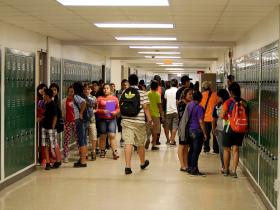Summer Learning Doesn’t Have to be a Drag
Most students don’t want to answer the question, “How did you spend your summer vacation?” with, “I went to summer school.” But students at a summer enrichment program in DeKalb County didn’t seem to mind spending more time in class.
Hear the broadcast version of this story.
A Different Approach
In a sixth grade social studies class, students seem to be enjoying their assignment: coming up with their own system of government. In the morning, students take classes. In the afternoons they participate in sports and other activities.
The Latin American Association runs this summer program at Cross Keys High School. It serves 130 students in grades 6-10. It will eventually expand to include grades 11 and 12.
Program Director Lynette Aponte says the program is academic, but optional. 
“The purpose is not, ‘You’ve failed a class, now you’re going to make it up,’ ” she says. “It’s really for you to gain that knowledge for the next year, like one of the teachers said, it’s to get that little bit of information to help you the next year.”
Addressing Summer Learning Loss
Education experts have long warned about the effects of “summer brain drain.” Research shows nine weeks away from school can cause students to forget a lot of what they’ve learned. This program lasts for about 4 weeks. Students will have 4-5 weeks off before school starts. Dr. Dana Rickman is the director of policy and research at the Georgia Partnership for Excellence in Education. She says summer programs, like this one, can help prevent that.
“Especially for low-income kids, or students who English is not their first language, especially if they’re not speaking English in the home, even four weeks over the summer can help stave off some of that loss,” Rickman says.
Sixth grader Jose Martinez believes it’s helping him.
“If I wasn’t in this program then I would be, like, home, not knowing what to do, just sitting in front of the computer,” he says.
Jose and the other middle schoolers in the program will go to DeKalb’s Sequoyah Middle School in the fall. The high schoolers will go to Cross Keys.
Cross Keys Assistant Principal Tracy Harrell says students in the program will have a leg up in the fall:
“Anytime you are offering remediation and additional exposure in terms of enrichment and you’re providing it in a relevant way that’s meaningful to the kids, they’re going to always remember that,” Harrell says.
Using What You’ve Got
One way the program makes content relevant to the students is by showing them the value of some unique skills they may not know they have.
Lisa Dillman usually teaches at Emory University. But for a morning, she’s teaching soon-to-be tenth graders how to translate documents from Spanish to English. When they’ve finished, Dillman sizes up their performance.
“I teach a class at Emory to graduating seniors who are majors in Spanish and Portuguese, and you’ve come pretty close in 45 minutes,” she tells the class. “So, something to think about, you’re already bilingual, so a possible career here? I see a lot of talent.”
Tenth grader Jessica Huerta says she’s not sure about a career, but says her translating skills should come in handy.
“They tell me that it’s a good thing to know two languages, so I think I’m good with that, knowing two languages,” she says. “It’s going to help me out in the future.”
This program mainly serves Latino students. 99 percent of the group qualifies for free or reduced meals. Program director Lynette Aponte says students are tested at the beginning and end of the program to track their progress. She says the idea is to know how kids are doing and provide extra support if needed:
“The goal is that our students graduate from high school and that all our students, as young as sixth grade, can look to the future and see that college is an option for them,” Aponte says
They seem to be planting the seeds at least. Sixth grader Jose Martinez says college is more than just an option for him.
“I know I’m gonna go and graduate,” he says.
Aponte and the other program leaders hope other students will follow suit.
9(MDAxODM0MDY4MDEyMTY4NDA3MzI3YjkzMw004))








